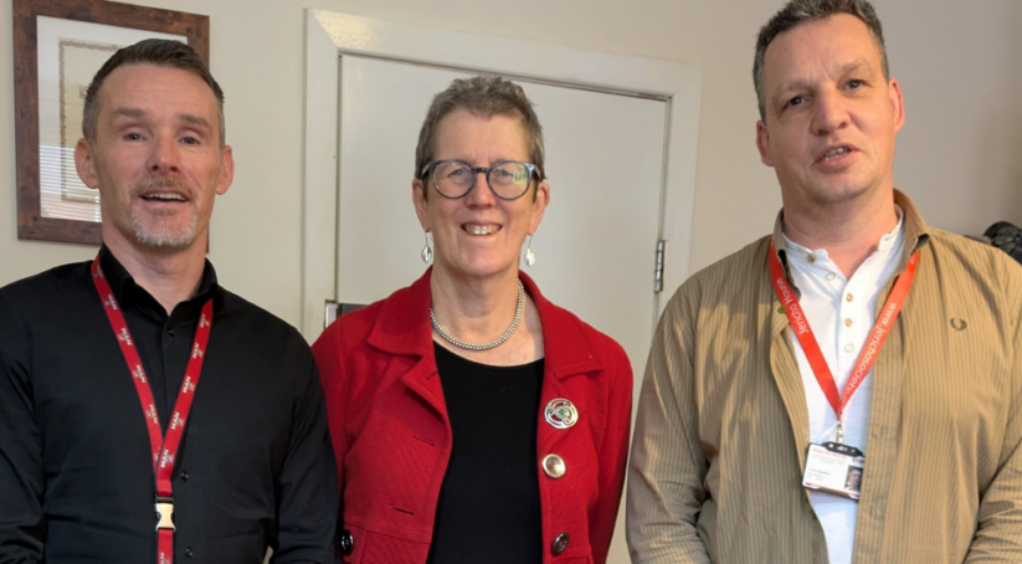ICB Chair visits Jericho House charity which helps men tackle addiction
The charity Jericho House, which helps men in Derby and Derbyshire with drug and alcohol addiction recovery, welcomed ICB chair Kathy McLean this week for a tour of their nine-bed residential house.
The charity looks after around nine men at any one time and 75 per cent remain abstinent long term.
On a monthly basis they also support around 50 family members either by phone, email, social media and face to face at family support meetings.
Jericho House is funded by residents’ enhanced housing benefits through Derby City Council and donations.
Manager Neil Ainslie said: “When the men arrive at Jericho they are at rock bottom. We help them to develop their self-worth and their self-control by nurturing their mind, body and spirit.
“Many of our ex-residents have gone on to have successful careers, everything from becoming GPs and paramedics to nurses, mechanics and everything in between and we’re so proud of the men, what they can achieve and the work we do. The most important thing is the fact they return to their family as a well-rounded father, son, brother or husband.”
It is an abstinence-based program that incorporates Cognitive Behavioural Therapy (CBT) and the 12-step model. The program emphasizes the value of lived experience, helping clients practically recognize and implement strategies and techniques in their daily lives.
The unit has been operating for over 20 years and estimates it has saved the NHS more than £10 million since its inception. Individuals can self-refer or be referred through their GP or social services, although there is typically a waiting list of one to four months.
Derby and Derbyshire Integrated Care Board Chair Dr Kathy McLean, said: “Jericho House shows the huge benefits that a lived experience model can have for people with addiction. It was clear from my visit what a huge impact both the facility and its leaders have on the men who come here.
“They not only help in the short term to get men back on their feet but are also an ongoing support network and community for those who sometimes have nowhere else to turn for support even once recovered.
“We’ve long known that prevention is better than cure and Lord Darzi has set out his aim for the NHS to move from a reactive to a preventative health and care system. Whilst we know there is high demand for services such as this it’s only by working together as a system, including the voluntary sector, that we will manage to offer more preventative services and relieve pressure on the NHS and other partners.”
The unit also has seven step-down facilities which help the men reintegrate into normal life once they have completed their time at Jericho House.
Of those who complete the primary and aftercare stage, around 90% gain long term abstinence-based recovery.
Kevin Spafford, a senior support worker, who has been in recovery for over 15 years, said: “I came here as a resident myself and remember what it was like. I know how these guys feel. Often, it’s just support they need, somewhere to talk, a place to be cared for, feel understood and to learn how to cope with the basics of life.
“Addicts don’t have to stick with a life full of crime, illness and struggles. With the right help so many good things can come from recovery. We often say recovering addicts make good parents because we show them how to be present and loving and there for their families.”
The men have a program of structured daily activities including morning focus and self-reflection groups, domestic skills and personal care, group therapy sessions, college courses, one-to-one key work sessions, structured outings, and evening self-help meetings.
All activities are based on personalized care plans, which are developed upon arrival and tailored to individual needs.
Their basic program lasts six months, but they continue to support individuals as they transition into supported housing, further or higher education, and eventually independent living and full-time employment and often keep connection with many individuals who left their unit years ago.
They were founded by Scotland’s Jericho Society which began in Greenock 1970. The Jericho Society has five houses across the UK including two woman only units.
The Jericho Society is in the process of winding up and transferring its assets to other charities.
The Derby staff team are now working to take over the operations of all Derby sites under a newly established charity, The Living Recovery Foundation. This transition will ensure they can continue their work.
The foundation is currently seeking support to help secure its future and sustain its impactful programs. For more information visit the website.

